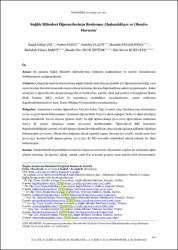| dc.contributor.author | Çöl, Başak Gökçe | |
| dc.contributor.author | Elkin, Nurten | |
| dc.contributor.author | Yalçın, Semiha | |
| dc.contributor.author | Nizamlıoğlu, Mustafa | |
| dc.contributor.author | Barut, Abdullah Yüksel | |
| dc.contributor.author | Onur Öztürk, Hande Nur | |
| dc.contributor.author | Kurtuluş, Eda Merve | |
| dc.date.accessioned | 2023-05-29T11:44:09Z | |
| dc.date.available | 2023-05-29T11:44:09Z | |
| dc.date.issued | 2023 | en_US |
| dc.identifier.issn | 2536-4499 | |
| dc.identifier.issn | 2602-2605 | |
| dc.identifier.uri | https://hdl.handle.net/11363/4749 | |
| dc.description.abstract | Amaç: Bu çalışma Sağlık Bilimleri öğrencilerinin beslenme alışkanlıkları ve obezite durumlarının
belirlenmesini amaçlamaktadır.
Yöntem: Çalışmada özel bir üniversitenin sağlık bilimlerinde okuyan gönüllü 277 öğrencinin katıldığı, soru
sayısı 60 olan literatür taranarak oluşturulmuş beslenme durum değerlendirme anketi uygulanmıştır. Anket
sonuçları ve öğrencilerden alınan demografik verilerden boy, ağırlık, vücut yağ yüzdesi ve hesaplanan Beden
Kütle İndeksi (BKİ) verileri ile tanımlayıcı istatistikten yararlanılmıştır. Anket verilerinin
değerlendirilmesinde ki-kare; Mann Whitney U testlerinden yararlanılmıştır.
Bulgular: Araştırmaya katılan öğrencilerin %67,9’u kadın, %32,1’i erkek olup, katılımcı yaş ortalamaları
21,02±2,13 yıl olarak bulunmuştur. Çalışmada öğrencilerin %29,2’si diyet yaptığını; %78,7’si öğün atladığını
beyan etmişlerdir. En sık atlanan öğünün %48,7 ile öğle öğünü olduğu (p=0,001); öğün atlama nedeninin
%50,2 ile zaman olmaması olarak (p=0,001) belirlenmiştir. Öğrencilerin BKİ durumları
değerlendirildiğinde normal ve hafif şişman öğrencilerin kendilerini obez olarak algılama eğilimde oldukları
bulunmuştur (p=0,001). Cinsiyetten bağımsız olarak egzersiz yapma durumu (p=0,028), yemek yeme hızı
(p=0,031), kendini hafif şişman görme (p<0,001) ile BKİ arasında istatistiksel olarak anlamlı bir ilişki
bulunmuştur.
Sonuç: Yetişkinlikteki alışkanlıkların temelini oluşturan üniversite döneminde yapılan bu çalışmada öğün
atlama davranışı ile egzersiz sıklığı, yemek yeme hızı arasında gruplar arası anlamlı fark bulunmuştur. Öğrencilerin normal ve hafif şişman olsalar dahi kendilerini obez olarak görmeleri beden algısını ortaya
koyma açısından önemlidir. | en_US |
| dc.description.abstract | Aim: This study was aim to determine the nutritional habits and obesity status of Health Sciences students.
Methods: In the study, a nutritional status assessment questionnaire including 60 questions, which was
created by a literature search and participated by 277 volunteer students studying in the health sciences at a
private university, was applied. Survey results and demographic data from students; height, weight, body fat
percentage and calculated Body Mass Index (BMI) data and descriptive statistics were used. Chi-square and
Mann-Whitney U tests were used to evaluate the survey data.
Results: 67.9% of the students participating in the research were female, 32.1% were male, and the average
age of the participants was 21.02±2.13 years. In our study, 29.2% of the students stated that they were on a
diet; 78.7% of the students declared that they skip meals. The most frequently skipped meal was lunch with
a percentage of 48.7% (p=0.001); The reason for skipping meals was determined as 50.2% of the lack of time
(p=0.001). When the BMI status of the students was evaluated, it was found that normal and overweight
students tended to perceive themselves as obese (p=0.001). A statistically significant relationship was found
between exercise status (p=0.028), eating speed (p=0.031), self-seeing overweight (p<0.001) and BMI,
regardless of gender.
Conclusion: Our study output is important in terms of higher rate of skipping meals in the university age,
when the foundations of the habits that have become entrenched in adulthood, in terms of exercise frequency
and eating speed as well as significant tendency of the normal and overweight students to perceive
themselves as obese. | en_US |
| dc.language.iso | tur | en_US |
| dc.publisher | İstanbul Gelişim Üniversitesi Yayınları / Istanbul Gelisim University Press | en_US |
| dc.relation.isversionof | https://doi.org/10.38079/igusabder.1146467 | en_US |
| dc.rights | info:eu-repo/semantics/openAccess | en_US |
| dc.rights | Attribution-NonCommercial-NoDerivs 3.0 United States | * |
| dc.rights.uri | http://creativecommons.org/licenses/by-nc-nd/3.0/us/ | * |
| dc.subject | Obezite | en_US |
| dc.subject | beden kütle indeksi | en_US |
| dc.subject | beslenme alışkanlığı | en_US |
| dc.subject | üniversite öğrencileri | en_US |
| dc.subject | Obesity | en_US |
| dc.subject | body mass index | en_US |
| dc.subject | nutritional habits | en_US |
| dc.subject | university students | en_US |
| dc.title | Sağlık Bilimleri Öğrencilerinin Beslenme Alışkanlıkları ve Obezite Durumu | en_US |
| dc.title.alternative | Nutritional Habits and Obesity Status of the School of Health Sciences Students | en_US |
| dc.type | article | en_US |
| dc.relation.ispartof | İstanbul Gelişim Üniversitesi Sağlık Bilimleri Dergisi | en_US |
| dc.department | Sağlık Bilimleri Fakültesi | en_US |
| dc.authorid | https://orcid.org/0000-0002-7627-9867 | en_US |
| dc.authorid | https://orcid.org/0000-0002-9470-2702 | en_US |
| dc.authorid | https://orcid.org/0000-0002-9344-0472 | en_US |
| dc.authorid | https://orcid.org/0000-0003-0067-3419 | en_US |
| dc.authorid | https://orcid.org/0000-0002-7861-0736 | en_US |
| dc.authorid | https://orcid.org/0000-0001-6445-0519 | en_US |
| dc.authorid | https://orcid.org/0000-0002-3041-5800 | en_US |
| dc.identifier.issue | 19 | en_US |
| dc.identifier.startpage | 194 | en_US |
| dc.identifier.endpage | 207 | en_US |
| dc.relation.publicationcategory | Makale - Ulusal Hakemli Dergi - Kurum Öğretim Elemanı | en_US |
| dc.institutionauthor | Çöl, Başak Gökçe | |
| dc.institutionauthor | Elkin, Nurten | |
| dc.institutionauthor | Nizamlıoğlu, Mustafa | |
| dc.institutionauthor | Barut, Abdullah Yüksel | |
| dc.institutionauthor | Onur Öztürk, Hande Nur | |
| dc.institutionauthor | Kurtuluş, Eda Merve | |



















